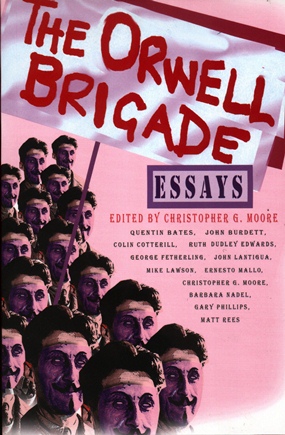Any semi-serious reader of well written books will have heard of George Orwell, whose most remembered books were ‘Animal Farm’ and ‘1984’. Orwell was, as described in the introduction by Christopher G. Moore, well before his time. “He warned in his novels and essays how the surveillance state was fundamentally incompatible with democracy.”
‘Animal Farm’ reflects events leading up to the Russian Revolution of 1917, and then on into the Stalin era in the Soviet Union. Orwell, a democratic socialist, was a critic of Joseph Stalin and hostile to Stalinism. The Soviet Union he believed, had become a brutal dictatorship, built upon a cult of personality and enforced by a reign of terror (completely correct). That cycle of events has been repeated many times over and can be seen today in countries in the Middle East, sub-Saharan Africa, North Korea and South America and within very recent memory in Cambodia and Burma. A fate that Thailand escaped by a hair’s breadth.

Orwell’s even more famous novel, ‘1984’, was written in 1949 and has predicted with chilling accuracy the state of affairs in many countries. Big Brother, the quasi-divine Party leader is kept as the leader through an intense cult of personality, and if that sounds like Kim Il-sung, through to Kim Jong-il and now Kim Jong-un you have probably read that wonderful book “Great Leader, Dear Leader” by Bertil Lindner.
But back to this book, The Orwell Brigade, is a series of essays by 12 different authors and edited by Christopher G. Moore. Some of the authors are known to us here in Thailand, such as John Burdett and Colin Cotterill and Christopher G. Moore himself, but the others who are domiciled in different regions of the world are just as readable.
One essay that really hit home for me was ‘Orwell and the IRA’, written by Ruth Dudley Edwards which concludes “Generations of Irish politicians … have created the conditions in which Orwellian liars of the stature of the Provisional IRA/Sinn Fein could flourish.”
A very accurate assessment of governmental inefficiency whilst following the statutes, is given by Colin Cotterill in his essay ‘Jai Yen’. In wishing to open a school for stateless underprivileged children he was passed on from one authority to another, until they just opened and ignored possible consequences.
At B. 395 at all major booksellers, this is one collection that should be on every reader’s book shelf. The 12 writers are advising everyone through their individual essays that you must be aware of rights and liberties, and fight for a better and fairer world. As I read the book, I could be brought to sadness as to what Homo sapiens has done to its own communities. Simple hunter-gatherers now torn asunder by greed and assumed power. The essays are very well written and it is just a delight to immerse one’s self in literary excellence. You will not regret purchasing this book, but you will regret if you do not read it! Congratulation Christopher G. Moore and your 11 writers, this will most likely be the best book you will read in 2013.




